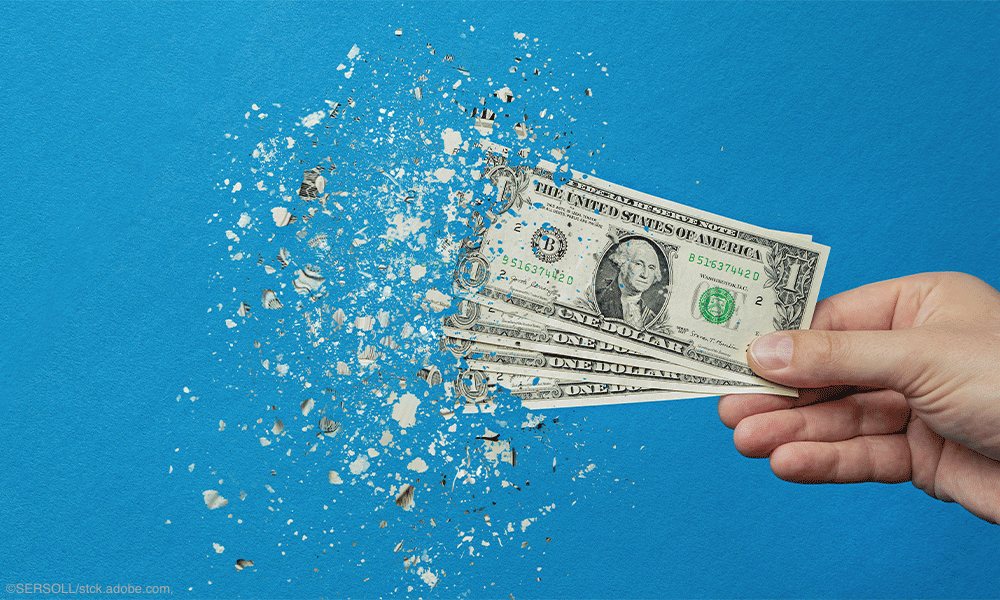Inflation’s impact on consumers and the economy
How it can actually be a healthy component in an economy’s growth.

Inflation is the concept that the cost of goods and services increases over time. What $10 can purchase today is more than $10 will be able to purchase ten or twenty years from now. As the price of goods and services increases over time, the purchasing power of that $10 diminishes. Many interpret inflation as having a negative impact on their lives since they must spend more to purchase the same items. However, inflation can actually be a healthy component in an economy’s growth.
Inflation is the increase in price of a broad basket of goods and services. It is not the increase in price of a single good or service. For example, if the price of bananas increases, that is not considered inflation. The rest of the economy would continue mostly unaffected. Inflation refers to the increase in prices across a broad range of goods and services which impacts many areas of the economy. In the U.S., the standard used to measure inflation is the Consumer Price Index (CPI). The CPI measures the weighted average of a basket of consumer goods and services. This basket of goods is intended to mimic the common products and services purchased by U.S. consumers and includes items such as food, energy, clothing, housing, medical care, education, communication, and recreation. The weighted average of these goods and services produces a percentage which is reported as the rate of inflation.
While there is often disagreement about healthy and unhealthy rates of inflation, most economists agree that inflation in the 5%-6% range and below is healthy for an economy, and inflation above the 9%-10% range is harmful to the economy.
What impact does inflation have on consumers and the economy?
Reduced Purchasing Power
As we have already discussed, the purchasing power of a dollar is reduced when inflation raises prices. To purchase the same items, consumers will have to spend more money than they did before. Those impacted the most by inflation are the ones holding cash or who are on a fixed income that is not inflation adjusted annually. Over time, their purchasing power can be significantly impacted.
Increased Spending
Due to fear that the value of their dollar will diminish, consumers and businesses attempt to spend their money before it does. If your cash is only going to lose value over time due to inflation, it is better to spend that money now on items that possibly won't lose value. Increased spending by consumers and businesses positively impacts the economy.
Interest Rates Rise
Increased spending by consumers and businesses means more money enters the money supply which can drive inflation even higher. To curb runaway inflation, the Fed will increase interest rates. Higher interest rates make borrowing money more expensive and results in higher payment amounts. The higher cost of borrowing causes consumers and businesses to reevaluate taking out loans to make major purchases. Money that would have been used as a down payment or as collateral now stays in their bank accounts earning interest. More money staying in bank accounts means less is being spent and there is less money in the money supply. This slows the rate of inflation.
Existing Fixed Rate Borrowers Benefit
Borrowers who already took out debt can benefit from inflation. The value of their monthly mortgage payments will decrease over time. For example, a fixed payment of $2,500 per month on a 30-year mortgage will decrease in value over the lifetime of that loan. Assuming their income is growing along with inflation, it will feel like they are paying less over time. Borrowers who are in variable debt products, however, will likely see their payments increase over time so that the value of those payments keep up with inflation.
Investors Target Stocks
Purchasing stock in companies that benefit from receiving more money due to rising prices is one way to offset the impact of inflation. A company’s stock price will likely increase as they earn more for the products they make. The value of an investor’s money will increase along with the stock price, which will offset some of the impact of inflation.
Many consumers feel the immediate impact of inflation and interpret it as a negative. Spending more on an item you are used to buying never feels great; however, modest inflation does serve an important role in the overall economy. Provided inflation stays within healthy ranges, it is something to take advantage of rather than fear.
About the Author
Jeff Witz, CFP® welcomes readers’ questions. He can be reached at 800-883-8555 or at witz@mediqus.com.
Disclaimer
200 North LaSalle Street - Suite 2300 - Chicago, Illinois 60601
312-419-3733 - Toll Free 800-883-8555 - Fax 312-332-4908 - www.mediqus.com
Investment advisory services offered through MEDIQUS Asset Advisors, Inc. Securities offered through Ausdal Financial Partners, Inc. Member FINRA/SIPC ∙ 5187 Utica Ridge Rd ∙ Davenport, IA 52807 ∙ 563-326-2064 ∙ MEDIQUS Asset Advisors and Ausdal Financial Partners, Inc. are independently owned and operated.
Is your practice ready for the Trump tariffs?
April 7th 2025Tariffs are set to drive up costs across industries — including health care — impacting everything from medical supplies to retirement accounts. Take a look at the ripple effects on medical practices and some proactive strategies for physicians to stay one step ahead.